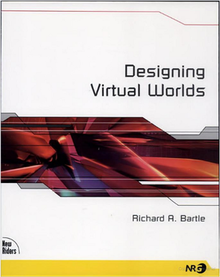Designing Virtual Worlds: Difference between revisions
No edit summary |
|||
| Line 229: | Line 229: | ||
==External links== |
==External links== |
||
* [https://books.google.com/books?id=z3VP7MYKqaIC&printsec=frontcover Preview at Google Books] |
* [https://books.google.com/books?id=z3VP7MYKqaIC&printsec=frontcover Preview at Google Books] |
||
* [ |
* [https://www.mud.co.uk/dvw/ Author's support site] |
||
* [https://mud.co.uk/richard/DesigningVirtualWorlds.pdf ''Designing Virtual Worlds'' freely downloadable PDF under the Creative Commons CC BY-NC-ND 4.0 license] |
* [https://www.mud.co.uk/richard/DesigningVirtualWorlds.pdf ''Designing Virtual Worlds'' freely downloadable PDF under the Creative Commons CC BY-NC-ND 4.0 license] |
||
{{MUDs}} |
{{MUDs}} |
||
Revision as of 19:37, 19 August 2021
 | |
| Author | Richard Bartle |
|---|---|
| Language | English |
| Genre | Non-fiction |
| Publisher | New Riders |
Publication date | 2003 |
| Publication place | United States |
| Media type | Print (Paperback) |
| Pages | 741 |
| ISBN | 0-13-101816-7 |
Designing Virtual Worlds is a book about the practice of virtual world development by Richard Bartle. It has been noted as an authoritative source regarding the history of world-based online games.[1] College courses have been taught using it.[2][3][4][5]
In 2021, the author made the book freely available under a Creative Commons license on his website.[6]
Contents
Designing Virtual Worlds argues that the fundamentals of player relationships to the virtual world and each other are independent of technical issues and are characterized by a blending of online and offline identity.[7] According to the book, it is the designer's role to know what will provide players with a positive game experience,[8] the purpose of virtual worlds is the player's exploration of self,[9] as well as for its expansion of the earlier 4-type Bartle gamer style taxonomy into an 8-type model.[10] The book also focuses on the practicalities of its subject.[11]
Reception
This section may require cleanup to meet Wikipedia's quality standards. The specific problem is: Please provide attribution so readers know who is saying these things about the book, and when these reviews were published. (May 2019) |
It has been called "the bible of MMORPG design"[12] and spoken of as "excellent",[13] "seminal",[14] "widely read",[15] "the standard text on the subject",[16] "the most comprehensive guide to gaming virtual worlds"[17] and "a foundation text for researchers and developers of virtual worlds"[18] that is "strongly recommended for anyone actually thinking about building one of these places"[19] and "describes the minimum level of competency you should have when discussing design issues for virtual worlds".[20]
In less favorable reception, one reviewer, while calling it a "must-read" work, said he found "much that was questionable, incomplete, or just erroneous" in it.[21]
References
- ^ Williams, J. Patrick; Smith, Jonas Heide (2007-03-28). The Players' Realm: Studies on the Culture of Video Games and Gaming. McFarland & Company. p. 31. ISBN 0-7864-2832-5.
- ^ Castronova, Edward (2004-08-26). "Virtual Worlds 101: Draft Syllabus". Terra Nova. Retrieved 2010-05-06.
- ^ Thomas, Douglas (2004-12-10). "COMM 499: Massive Multiplayer Online Games". University of Southern California. Archived from the original on 2005-02-14. Retrieved 2010-05-06.
- ^ Delwiche, Aaron (2004-12-10). "COMM 3344: Games for the web". Trinity University. Retrieved 2010-05-06.
- ^ Kipp, Neill A. (2003-12-05). "CSC 5807 — Special Topics" (PDF). University of Colorado Denver. Archived from the original (PDF) on 2004-07-31. Retrieved 2010-05-06.
- ^ "Richard Bartle Releases His Classic Book Designing Virtual Worlds for Free Online". New World Notes. 2021-08-17. Retrieved 2021-08-17.
- ^ Wallace, Mark (2006-01-31). "In Celebration of the Inner Rogue". The Escapist (30): 1–2. Retrieved 2010-05-06.
- ^ Klastrup, Lisbeth (May 2007). "Why Death Matters: Understanding Gameworld Experience". Journal of Virtual Reality and Broadcasting. 4 (3). ISSN 1860-2037. Archived from the original on 2010-07-14. Retrieved 2010-05-06.
- ^ Koster, Raph (2006-01-05). "Traits, stories, and holy grails". Raph Koster's Website. Retrieved 2010-05-06.
- ^ Yee, Nick (June 2005). "Motivations of Play in MMORPGs: Results from a Factor Analytic Approach" (PDF). Proceedings of the DiGRA Conference 2005. Digital Games Research Association. Retrieved 2010-05-06.
- ^ Klastrup, Lisbeth; Tosca, Susana (2004). "Transmedial Worlds — Rethinking Cyberworld Design" (PDF). Proceedings of the 2004 International Conference on Cyberworlds. IEEE Computer Society: 409–416. Retrieved 2010-05-06.
- ^ Sempere, Andrew (2009-10-01). "The Work of Art in the Age of Virtual Production" (PDF). IBM Research. Archived from the original (PDF) on 2011-08-11. Retrieved 2010-05-05.
{{cite journal}}: Cite journal requires|journal=(help) - ^ Jennings, Scott; Macris, Alexander (2005-12-19). Massively Multiplayer Games For Dummies. For Dummies. p. 7. ISBN 0-471-75273-8.
- ^ Zichermann, Gabe; Linder, Joselin (2010-03-29). Game-Based Marketing: Inspire Customer Loyalty Through Rewards, Challenges, and Contests. John Wiley & Sons. pp. 149. ISBN 0-470-56223-4.
- ^ Geraci, Robert (2010-03-05). Apocalyptic AI: Visions of Heaven in Robotics, Artificial Intelligence, and Virtual Reality. Oxford University Press. pp. 95. ISBN 0-19-539302-3.
- ^ "Participants". Living Game Worlds IV. Georgia Institute of Technology. 2008-12-01. Retrieved 2010-05-06.
- ^ Book, Betsy (October 2004). "Moving Beyond the Game: Social Virtual Worlds" (PDF). State of Play Conference 2. New York Law School. Retrieved 2010-05-06.
- ^ Levy, Luis; Novak, Jeannie (2009-06-22). Game Development Essentials: Game QA & Testing. Delmar Cengage Learning. p. 119. ISBN 1-4354-3947-3.
- ^ Castronova, Edward (December 2003). "On Virtual Economies". Game Studies. 3 (2). Retrieved 2010-05-06.
- ^ Green, Brian (2003-12-24). "untitled comment". Terra Nova. Retrieved 2010-05-06.
- ^ Rickey, Dave (2003-08-12). "If you can't say anything nice..." Engines of Creation (6). Skotos. Retrieved 2010-05-06.
